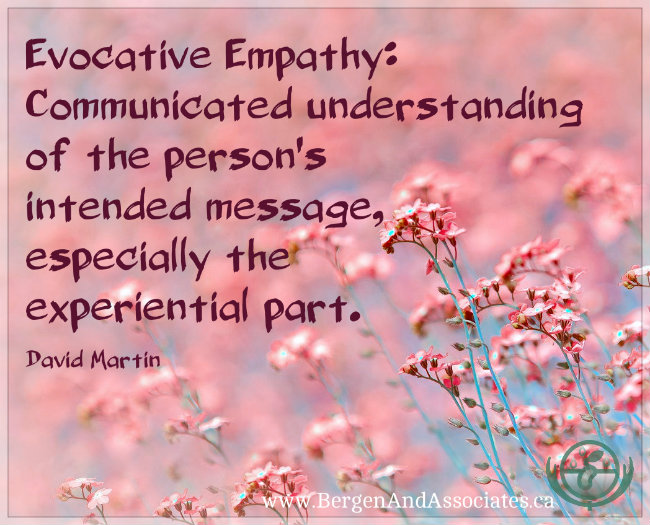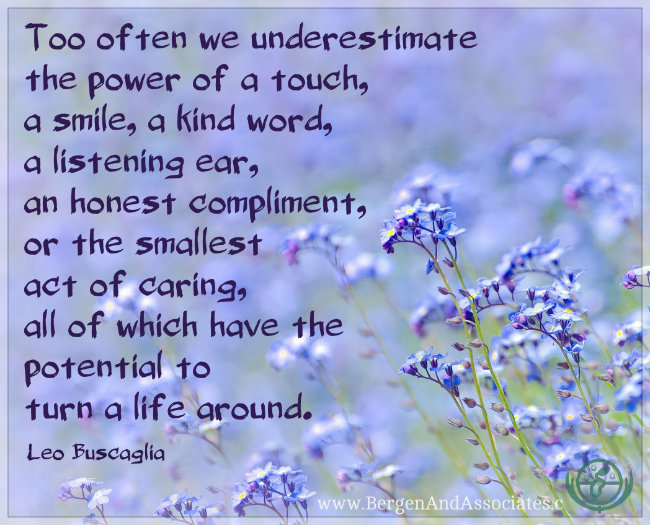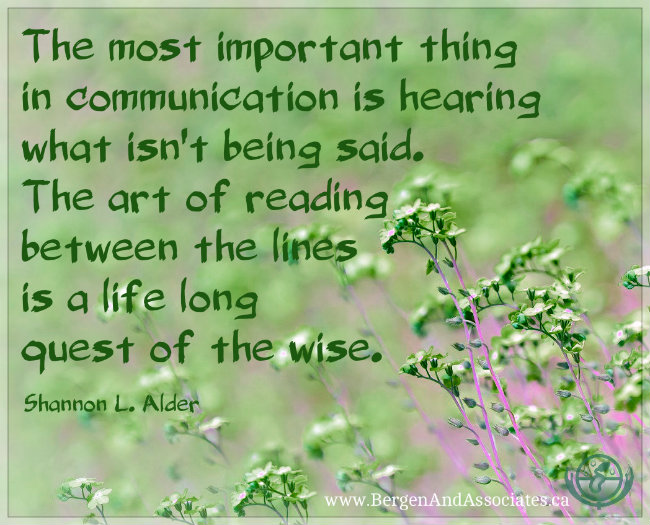For many years, I taught students at the School of Occupational Therapy at the University of Manitoba. I loved the teaching and discussions…the marking and administration–not so much! 🙂
One of my favourite courses to teach was “Advanced Communication Skills”…given the finite amount of hours I had to teach content, we decided I would focus on “Evocative Empathy”, with the help of University of Manitoba’s David Martin’s textbook.

This wasn’t so much head learning as heart learning…
Initially, it would drive the students a little squirrelly as I prohibited them from asking questions in order to get to know someone. Rather I had them work to emotionally connect with what a person was telling them, and then communicate their understanding of what they had deeply heard.
These students were so used to asking questions to get to the bottom of things. But the thing is, when you ask a person a question, you get an answer from their head. When you hear what is behind what they just said, and you gently let the other person know all of what you just heard, you touch their heart.
It is powerful stuff.
Imagine you are working with a patient to teach them how to put their shirt on after they have had a stroke and one side of their body isn’t working. The patient says: “I’ve done this for 80 years without even thinking about it, and now it takes me 15 minutes and a bunch of help to put this stupid shirt on.”
What would you say?
- “Is this too hard for you to do today?”
- Well, I’m your therapist and I’m here to help you do it better.
- Aren’t you lucky to be in a rehab ward where you can relearn how to it.
An empathic response would hear the feeling underneath and notice it, and create space for it to be felt:
- “It totally sucks that you have to struggle with something that used to be so automatic. Losing your independence like this must be so hard to wrap your head around.” OR
- “You sound so furious that the littlest thing is such a big production. Life is so different than it used to be”
Can you hear the difference? Can you imagine what it would be like to hear the latter responses instead of the former as you are learning a whole new way of doing things with only half your body?
So…the students would find is SOOO hard at first to communicate in a way that just noticed and was present with the other person’s (unspoken but present) experience. It would leave them tongue tied and frustrated, unable to speak fluently in sentences. Competent, caring, and experienced folks almost unable to speak.
Then, they would start to get the hang of it…and would use it incessantly and always–often in a teasing and exaggerated way:
- Carolyn, I hear you saying that you really want our papers in on time, and that you’ll be frustrated if they are in late
- Carolyn, when my cell phone went off in class, it must have annoyed you as you wanted to teach the class. I apologize for the way my cell phone interrupted the other students concentration in a way that my have irked them as well.
- Carolyn, my sense is that the entire class is completely overwhelmed with the assignment you gave us considering what else is due this week. Some students are almost paralyzed with the pressure. I’m quite sure that you would feel distressed if you knew how this deadline was affecting us.
It was often said with a wink and a barely concealed smile.
By the end of the 11 weeks of the course, as we sat in a circle reflecting on the learning of the previous weeks, the students weren’t laughing anymore. They were sobered.
They told stories like this:
- I’ve heard more from my best friend in the last few weeks than I have in years previous. I could not believe how she opened up to me once I just very clearly let her know I was listening.
- My young child has far less tantrums now than she did in the summer. When I hear her deeply, she doesn’t get nearly as mad nearly as often
- My relationship with my mother has improved so much since I started this course. She and I are getting along better than we have in years.
These skills of evocative empathy developed all the skills of emotional intelligence over the course of just a few weeks. There are five components of emotional intelligence:
- Self Awareness: Being aware of what is going on inside of you and the effect that has on others. A huge part of empathy is using what you are feeling to understand what the other is feeling
- Self Regulation: Being able to manage what you are feeling and expressing what is optimal for at the situation. This is huge in empathy…because when your kid tells you he broke a bit jar of syrup all over the counter and the floor, you might have a very powerful challenge to respond in a way that is sensitive to him, given that you have your own instinctual response to the sticky disaster.
- Internal motivation: Having an internal desire to grow to be a better person…not to get rich or have status (those would be external motivators)…but a continuous awareness and effort to be aware of that which happens around you in order to better fine tune your own internal instincts. Empathy is a skill that develops over time, and effective empathy must be developed to fit each person’s style with whom you come in contact
- Empathy: Understanding another person’s emotion—not as yourself, but from their perspective. For example, getting on a plane might be no big deal to you, but may create weeks of anxiety for your spouse. Empathy understands the anxiety exists, acknowledges it and the impact of it, even if it would all be inconsequential to you. At times this is challenging…to understand why prostitution makes sense, or why a person feels a need to take a swing at another. This is not about excusing behavior, but rather about understanding it.
- Social skills: Being able to manage and negotiate the conversations with others to use the insights of empathy and awareness through effective communication, to be able to express the ideas in a manner that others can absorb and use, and connection can be maintained even while you express difficult or controversial behaviours.

It was during the last two weeks or so of the course, that the students would spontaneously bring up a significant issue: the ethics of empathy and emotional intelligence.
One year, a student named learning evocative empathy as a “superpower”. She realized the incredible ability this way of relating others had–empathy is able to sway conversations, elicit cooperation, and evoke people to disclose parts of themselves that they rarely allowed others to see.
The student acknowledged that this superpower could be used for “good and evil” (as all superpowers can be).
The students would talk about how they were more likely to be able to return an item to a store when they used gentle empathy with the store clerk first. Their children were more likely to clean their rooms, and their parents more likely to overlook these busy students’ neglect of household chores when the students would switch to being empathic rather than argumentative.
There was an awareness that they could elicit behavior that they wouldn’t otherwise get from someone when they profoundly listened and communicated that understanding.
- There was a potential that this could be self-serving.
- It could be manipulative.
- It could ultimately break connection, rather than enhance it—once a person realized they had been played.
There was also an awareness that it made sense to use their newfound emotional intelligence judiciously.
- Opportunity– While deeply understanding another human being is extraordinarily enriching for all involved…and sometimes can happen in relatively brief moments—it does take time. There are times for an occupational therapist on a Friday afternoon when there are 3 discharges to prepare for that it simply makes sense to “stick to business”…that opening someone up with deep listening would leave them raw and open without the time to finish the conversation.
- Timing–There have been occasions where I’ve sat with clients who need to “hold it together” until the end of the term…and we mutually decide to hold off going deep for a period until it makes sense to. The time to commiserate with how a colleague is dismissive of your partner may not be in the moment at the Christmas party when ongoing light and pseudo cheerful conversations are what is cultural protocol—it may best be postponed until the next morning.
- Task– There are times when efficiency requires hunkering down and “gettin’er done”. Like when the production line needs to be productive, or the columns need to be added and the ledger sheet of expenses and income reconciled with the tax deadline is looming. Evidence suggests that tasks like accounting and manufacturing are better done with less emotional intelligence to be more efficient.

It is said that Martin Luther King had a high degree of emotional intelligence…his “I have a dream” speech was masterfully delivered so that it gives me the shivers to listen to it decades later. He understood what moved people. He understood how to speak to people’s hearts as well as their heads.
It is also said that Adolf Hitler had a high degree of emotional intelligence. He learned how to sway behavior. He studied videos to perfect hand gestures and voice intonation…he pulled people into his vision in ways that had them act fundamentally against the core of what they believed, of what we as humans intuitively know to be right and just and good…he got German soldiers believing outrageous ideas and doing heinous acts by seductively convincing them to believe things that we can now hardly wrap our heads around.
It is worth developing an ability to be deeply empathic, to be able to be fully present with oneself, and to regulate one’s own body and emotions…all of these skills enhance connection with others significantly.
But like any other powerful tool, emotional intelligence can be used to build up or tear down, elevate or disintegrate another, deeply empower or wildly manipulate the other.
How will you use your power of emotional intelligence?






Write a Comment